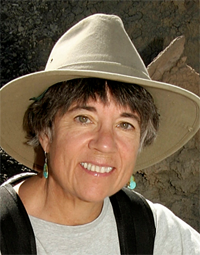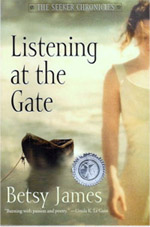by Betsy James
 I carry a journal with me, always. Especially in Mexico.
I carry a journal with me, always. Especially in Mexico.
We drove out of Ciudad Oaxaca in an old Nissan pickup with no seat belts: myself, another American, and three Mexican teachers intent on providing reading material for indigenous students.
The state of Oaxaca speaks at least fifteen languages. Like the children of minorities in the United States, indigenous kids start school handicapped by an ignorance of the language of instruction—in this case, Spanish. The schools had made little provision for them, and their teachers had begun to make one-off picture books for them in Zapotec, Mixe-Zoquean, Chocholteco. I’d been invited to Oaxaca to observe in a few schools—that’s what the truck trip was about—and later, when we got back to the capital, to give a workshop in grassroots picture book design.
At the teachers’ meeting I’d held up my journal and explained, in my own unreliable Spanish, that I always take notes—in Spanish, fichas—as I go along.
They looked worried.
“It’s just for me,” I said. “I’m a writer.”
They looked alarmed. Well, my own mother had been alarmed at her daughter’s choice of profession.
Five of us squashed into the little truck and climbed out of the cactus flats of the dry interior into the Sierras, on a highway called a highway only because everything else was dirt. We switchbacked through darkening pines, passed women hauling firewood with hempen tump lines, and crested the high, piney ridge just at dusk. Looked east. Stopped the truck.
Beneath us an ocean of cloud rolled to the horizon, vast and shadowy and blue with night. The world had sunk away, and only this endless sea was left: dim, chill, perfectly still except, deep within it, the echoing calls of monkeys and some unknown bird.
“My journal….” It was in my pack, stuffed in a cloth duffel. I yanked out of the duffel…not the journal, but a pair of pink bikini briefs.
“That’s not a journal!” said Ofelia. “That’s your monkey cage!”
Mi jaula de changos. I wrote it down. I take notes, it’s what writers do.
The teacherage in Santa María Tiltepec was a clutch of adobe shacks, patchily lined with plastic sheeting. From the kitchen ceiling hung one bare light bulb and the hammock where a plump grub of a baby slept, stuffed into six layers of poly-knit. Mauricio, the lisping three-year-old who had outgrown the hammock, told us his name was Mowicio, and thus the adults addressed him, gravely: Mowicio. Supper was stale bread and weak, milky, boiling-hot coffee served in bowls the size of two hands. I got out my journal. Explained about how I’m always taking fichas, notes: ando fichando.
They looked concerned. I thought, Dang, they’ve pegged me for an anthropologist. Writers are misunderstood.
Outside, a familiar smell of roast corn, chile, woodsmoke. And bad drains: that rural Mexico thing of letting funky water run anywhere, mixed with garbage and rotting fruit. The crude outhouse had a hand-sawn seat, the hole chopped with an axe. Smell of excrement—pig, dog, human—mixed with smoke and clear, pine-scented wind.
We slept in our clothes, on grass mats laid on the floor of the fifth grade classroom. It was cold. I wore everything I had. Even my monkey cage.
For breakfast, thick corn tortillas and a caldo of green beans and egg, guacamole, smoky chile and fava beans flavored with an herb I didn’t know and didn’t like. I took notes. We walked to the tiny school. In the playground a flock of girls lit around me, gaping and smiling and touching my hair. They said, “What’s your name?”
“Betsy.”
“Madre de Diós!” and they were gone in a rush, like sparrows. The headmaster, after a polite cough, explained that in Zapotec betsi means “head louse.”
Possibly I could have remembered that without writing it down. But life passes so quickly, I told the teachers, waving my journal. One forgets things. That’s why it’s so important to go along taking fichas.
They looked appalled. But why should they believe somebody named Head Louse?
I took notes on the school. The preschoolers had painted a mural of their steep village, all canyonside, a strip of blue sky at the top. Two boys had a right fistfight on the floor. Third grade was painful, the panicked teacher as shy as the students. I asked the kids what they would like to write about. Their faces shone. In one voice they shouted, “Lions!”
“Keep a journal,” I said. “Write stories.”
The fifth graders, like preteens anywhere, hid their writing with their bodies. They had been seated boy-girl-boy-girl; they stayed calmer that way, said their teacher, because at this age, in this culture, boys and girls don’t talk to each other. They asked my name. “Elizabeth,” I said.
I explained about my fichas. They looked uneasy. Horrified, in fact.
We crammed into the pickup and headed back to the city. “Journaling is so important for writers,” I said, “but everybody looks at me like I’m nuts. I’m not going to say anything more about taking notes.”
“Best not,” said Ramón. Politely, of course. “Ando fichando means ‘I go around picking up men.’”
 Betsy James is the author-illustrator of sixteen books and many stories for adults, teens, and children. Her latest novel, Listening at the Gate, is a Tiptree Award Honor Book and a New York Times Best Book for the Teen Age. Forthcoming: Roadsouls, her next fantasy, will be available in 2016 from Aqueduct Press. Visit her at BetsyJames.com and ListeningAtTheGate.com.
Betsy James is the author-illustrator of sixteen books and many stories for adults, teens, and children. Her latest novel, Listening at the Gate, is a Tiptree Award Honor Book and a New York Times Best Book for the Teen Age. Forthcoming: Roadsouls, her next fantasy, will be available in 2016 from Aqueduct Press. Visit her at BetsyJames.com and ListeningAtTheGate.com.
This article was originally published in the June 2012 issue of SouthWest Sage and is reprinted here by permission of the author.

